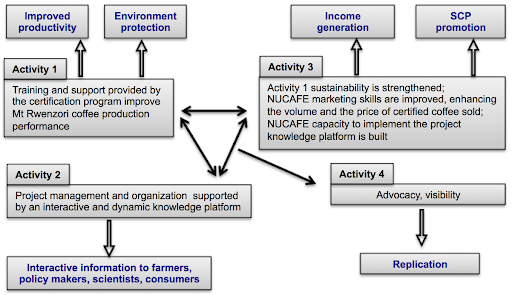Objectives
Overall objective: To generate sustainable wealth creation for improved livelihood and poverty alleviation in rural areas, through green economy and SCP promotion in Africa.
By 2030, it is expected that African countries adopt and implement TC as an efficient agriculture production model, which enhances sustainability, for the benefit of poor rural communities and national economies. The TC model is implemented on export products such as coffee, cocoa and vegetable from various locations in East Africa, in response to the growing demand for certified production in Europe and other international markets. The model also attracts local producer communities to cater to the new emerging market for certified products in modern, developing cities in East Africa. Overall, the project will contribute towards opening the path for green economy in Africa.
Specific objective: Implement a new model of coffee value chain in Africa based on triple-certificate association - Geographical Indication (GI), ‘Fair Trade’ (FT) and ‘Organic’ (ECO) – to promote the highly valued Mount Rwenzory Arabica production. The model empowers farmers to increase production and revenue and to better access international market, while conserving the production environment.
By the end of the project, TC model will be implemented in an efficient manner that will structure, organize and empower Mt Rwenzori Coffee Value Chain (CVC). Promoting TC, will also generate recognition of the role of vulnerable groups (women and youth) in coffee production and facilitate their integration in the production chain.
The six cooperatives operating in the area and their umbrella union NUCAFE have adopted the TC model, and have already established its implementation; 16,820 ha of coffee land are directly under TC scheme and preserved from degradation; direct exports (from producers to retailers in consumers countries) have increased by 20% and fetch a higher reward (+35%). 21000 farmers directly benefit from the action.
Action
The workplan and activities are presented in the figure below:

Output 1: GI, FT and ECO certifications achieved and implemented:
21,000 farmers from six cooperatives (Bukonzo (2), Musasa, Karangura, Kabonero and Kateebwa) from Kasese and Kabarole Districts in Mt Rwenzori region implement the triple certification scheme. Coffee from these regions receives appropriate labels and is marketed in the specialty coffee market at consumer and retailer levels. Coffee exports from Mt Rwenzori area increase by a minimum of 20%.
Mt Rwenzori coffee production chain is capacitated and empowered; an organized structure is created, which is suitably trained and equipped and meant to remain operational after the termination of the project; 35 positions are created for a majority of women and youth. The legal and political framework for TC implementation framework is evaluated to best adapt the proposed initiative to the local context.
Output 2. A dynamic, interactive knowledge platform is created, supporting the project development:
The knowledge platform output is critical and central to the action. It provides a powerful organization tool for information exchange, learning, management (monitoring) visibility and advocacy of the triple certification process. Meant to evolve as an open-access knowledge system, it is accessible to all coffee actors from East Africa who can obtain direct information about coffee production and certification. Consumers and retailers from Europe and other market are able to obtain timely and detailed information about Mt Rwenzori production (site description, traceability of the production) through dynamic interfaces accessible by Internet, conferring an important marketing role to the platform. The platform remains active after the project termination.
Copyright © 2022 (v2.1.0)